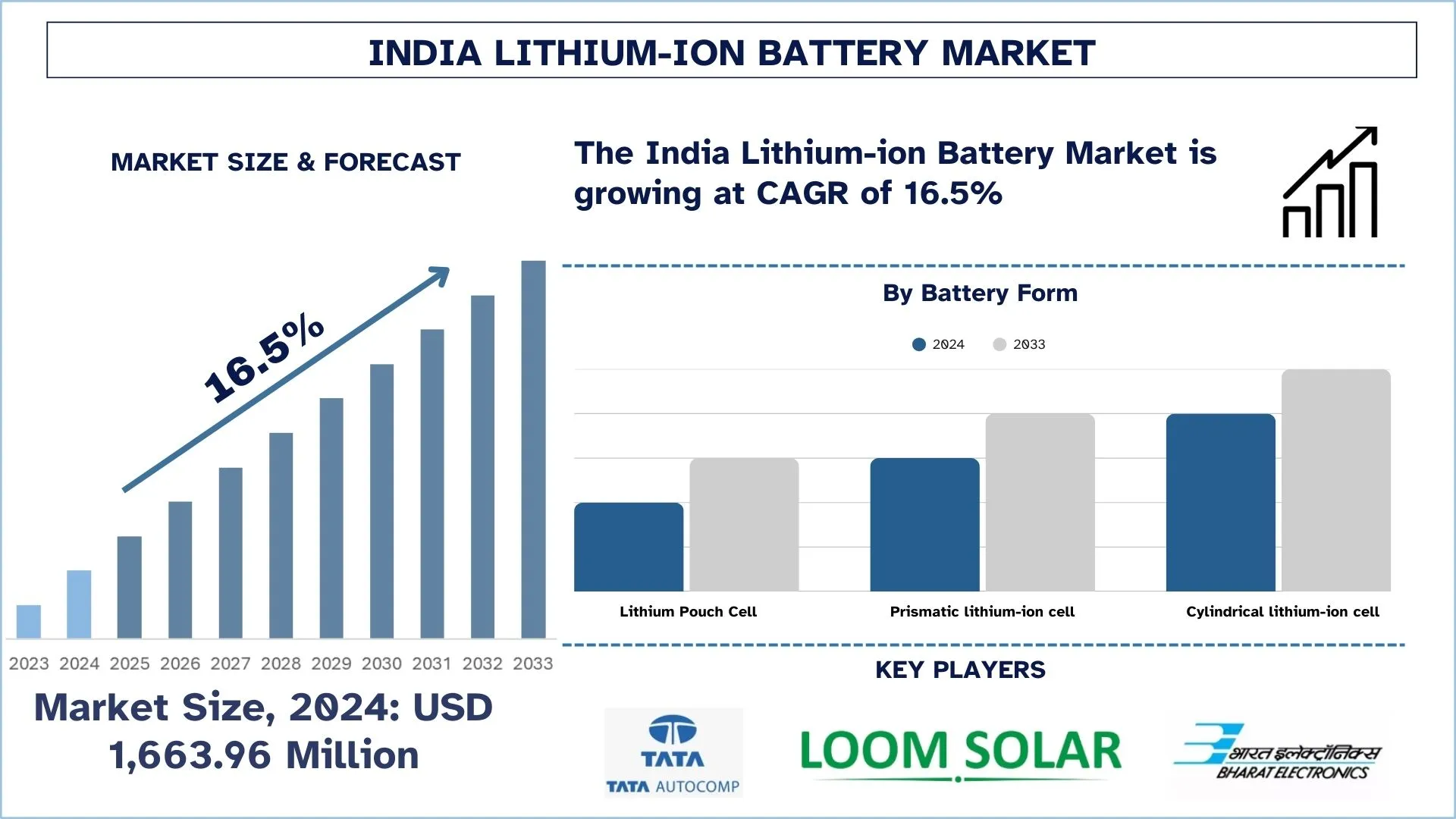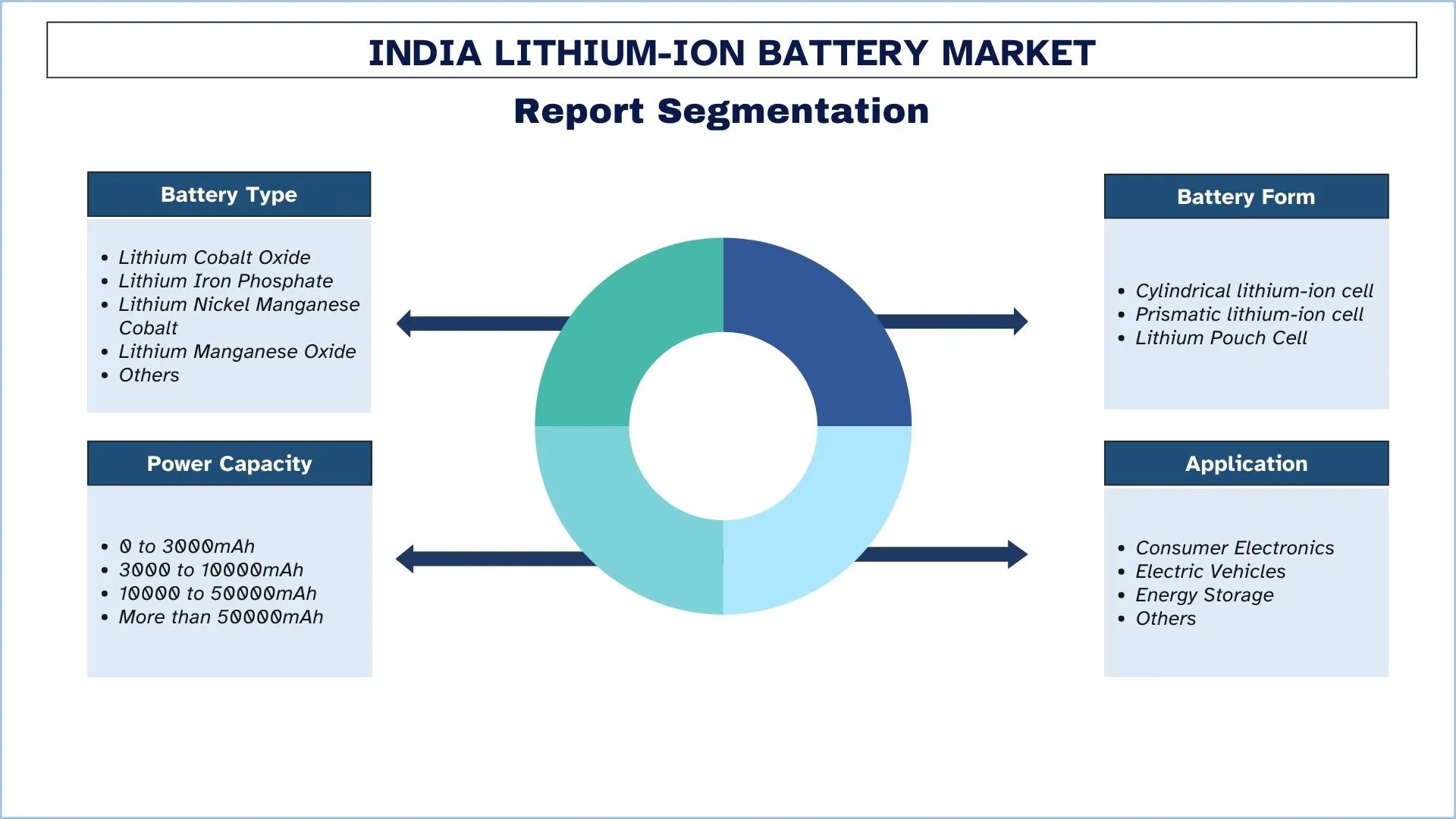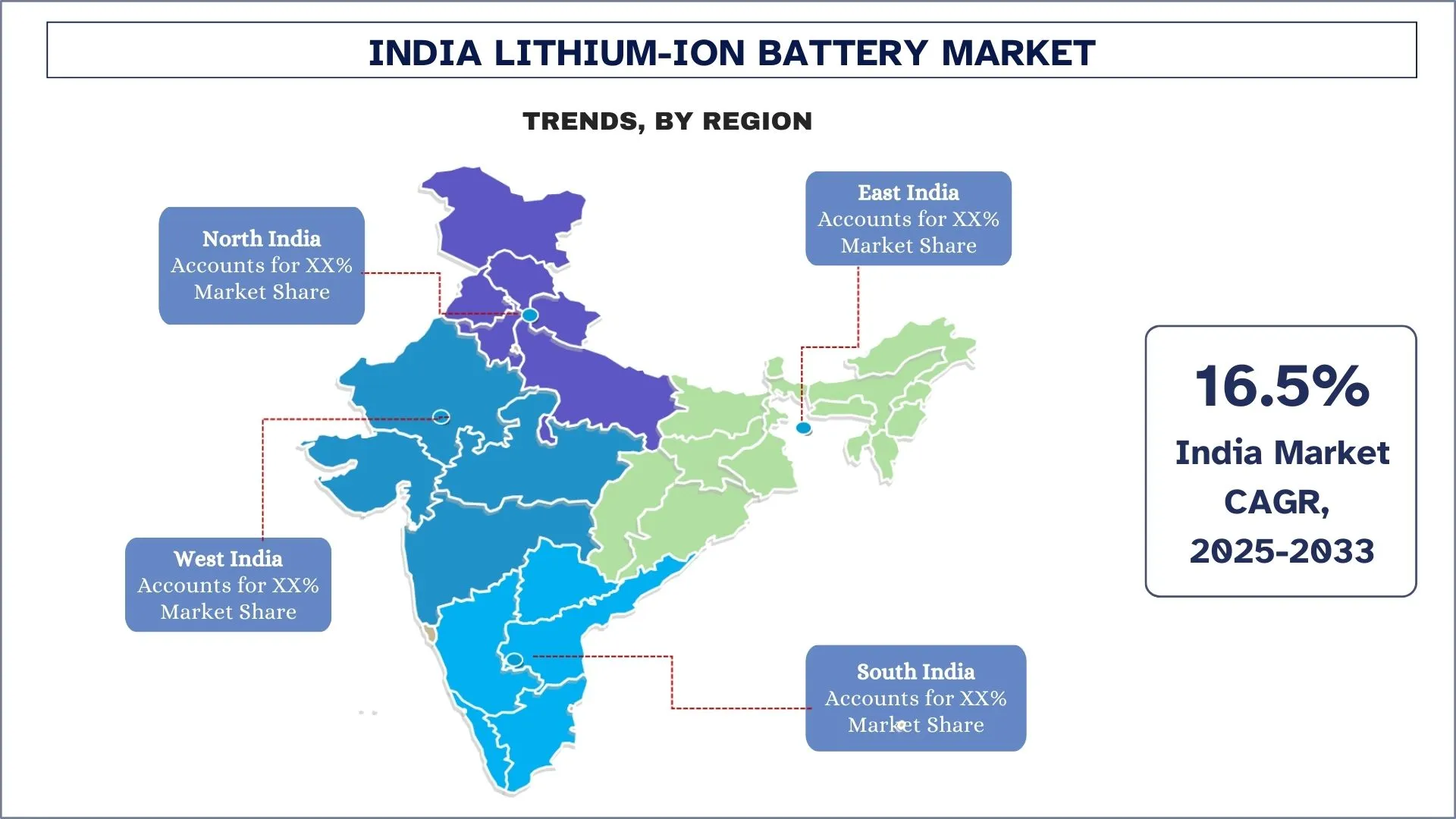India Lithium-ion Battery Market: Current Analysis and Forecast (2025-2033)
Emphasis on Battery Type (Lithium Cobalt Oxide, Lithium Iron Phosphate, Lithium Nickel Manganese Cobalt, Lithium Manganese Oxide, and Others); Battery Form (Cylindrical lithium-ion cell, Prismatic lithium-ion cell, and Lithium Pouch Cell); Power Capacity (0 to 3000mAh, 3000 to 10000mAh, 10000 to 50000mAh, and more than 50000mAh); Application (Consumer Electronics, Electric Vehicles, Energy Storage, Others); and Region/Country

India Lithium-ion Battery Market Size & Forecast
The Indian Lithium-ion Battery Market was valued at USD 1,663.96 million in 2024 and is expected to grow at a strong CAGR of around 16.5% during the forecast period (2025-2033), owing to a surge in electric vehicle production.
India Lithium-ion Battery Market Analysis
The Indian lithium-ion battery market is expected to grow significantly during the forecast period due to increasing demand for electric vehicles (EVs) and the growing need for renewable energy sources. The Indian government’s push for EV adoption and the introduction of favorable policies and incentives for EV battery manufacturers are also driving market growth. For instance, by 2030, the Indian government intends to have a fleet that is 30% electric. In addition, the goods and services tax (GST) on EVs was reduced from 12% to 5% in July 2019, and income tax exemptions for potential EV buyers were announced by the Indian government. Moreover, the increasing demand for energy storage solutions for grid-connected renewable energy systems is also expected to boost the market for lithium-ion batteries in India.
India Lithium-ion Battery Market Trends
This section discusses the key market trends that are influencing the various segments of the India Lithium-ion Battery market, as identified by our team of research experts.
Increasing Investments in Battery Manufacturing
Increasing investments in battery manufacturing are a significant opportunity for the Indian lithium-ion battery market. The Indian government has set a target of achieving 175 GW of renewable energy capacity by 2022, which will require a significant increase in the production of lithium-ion batteries. As a result, several industry players are investing in the development of battery manufacturing facilities in India. These investments are expected to support the growth of the lithium-ion battery market by increasing production capacity and improving the supply chain. For instance, Neuron Energy, a Mumbai-based lithium-ion battery manufacturer, will invest ₹500 million (USD6.04 million) to increase production capacity.
India Lithium-ion Battery Industry Segmentation
This section provides an analysis of the key trends in each segment of the India lithium-ion battery market report, along with forecasts at the regional levels for 2025-2033.
The Lithium Cobalt Oxide Market Holds the Largest Share of the India Lithium-ion Battery Market.
Based on battery type, the Indian lithium-ion battery market is segmented into lithium cobalt oxide, lithium iron phosphate, lithium nickel manganese cobalt, lithium manganese oxide, and others. Among them, the lithium cobalt oxide category dominates the growth of the segment. The use of LCO batteries has helped to drive the growth of the lithium-ion battery market in India, particularly in the electric vehicle and energy storage sectors. As demand for these applications continues to grow, the use of LCO batteries will likely continue to play an important role in the development of India’s energy infrastructure.
The Cylindrical Lithium-Ion Market Holds the Largest Share of the India Lithium-Ion Battery Market.
Based on battery form, the Indian lithium-ion battery market is segmented into cylindrical lithium-ion cell, prismatic lithium-ion cell, and lithium pouch cell. Among them, cylindrical lithium-ion dominates the lithium-ion battery market in the region and will continue to do so during the forecast period, as cylindrical batteries are more compact and space-efficient than other battery shapes, such as prismatic or pouch cells. This makes it easier to integrate into the design of electric vehicles and allows for more flexibility in terms of the size and shape of the battery pack.

North India Leads the Market
North India dominated the Indian lithium-ion battery market in the country as the region is home to several major cities, including Delhi, Chandigarh, and Jaipur, which are experiencing rapid industrialization and urbanization. This has resulted in a growing demand for lithium-ion batteries across various sectors, such as automotive, consumer electronics, and renewable energy storage. Furthermore, government initiatives promoting electric vehicles and renewable energy adoption have also boosted the market in this region. For instance, the top four MoUs in the MSME (Micro, Small & Medium Enterprises) sector were all signed by Hong Kong’s Tauschen International Pvt Ltd. In 2023. Tauschen E-Motors Pvt Ltd will invest Rs 4,100 crore to establish manufacturing facilities for electric vehicles in Agra. Also, the company’s Indian subsidiary will establish a lithium battery plant in Agra for which it has signed an MoU for an investment of Rs 1,640 crore and is likely to invest a total of Rs 10,000 crore in the project.

India Lithium-ion Battery Industry Overview
The Indian lithium-ion battery market is competitive and fragmented, with the presence of several country market players. The key players are adopting different growth strategies to enhance their market presence, such as partnerships, agreements, collaborations, new product launches, geographical expansions, and mergers and acquisitions.
Top India Lithium-ion Battery Companies
Some of the major players operating in the market include Tata AutoComp Systems Ltd, LOOM SOLAR PVT. LTD., TDSG, SAMSUNG SDI CO., LTD., Bharat Electronics Limited (BEL), Panasonic Industry Co., Ltd., TOSHIBA CORPORATION, Okaya Power Pvt. Ltd., Hitachi High-Tech Corporation, and Luminous India (Schneider Electric).
Recent Developments in the India Lithium-ion Battery Market
In Dec-22, GODI India, the first Indian company to get BIS certification to sell lithium-ion cells developed and produced locally, today announced the beginning of production of India’s first-ever 5.2 Ah 21700 cylindrical lithium-ion cells with an energy density of 275 Wh/kg based on silicon anode technology. The electrode composition has been indigenously developed as per the market requirement.
In Jun-21, the French battery system maker Forsee Power started its series production of lithium-ion batteries for electric two-wheelers (E2W) and electric three-wheelers (E3W) in Pune (Chakan Industrial Area, 35 km from Pune Airport).
In Jun-21, Tata Motors signed an agreement with BluSmart Electric Mobility for delivering 10,000 XPRES T EVs to the company. This deployment of 10,000 units makes this the biggest ever EV fleet order in India.
India Lithium-ion Battery Market Report Coverage
Report Attribute | Details |
Base year | 2024 |
Forecast period | 2025-2033 |
Growth momentum | Accelerate at a CAGR of 16.5% |
Market size 2024 | USD 1,663.96 Million |
Regional analysis | North India, South India, East India, and West India |
Major contributing region | North India is expected to dominate the market. |
Companies profiled | Tata AutoComp Systems Ltd, LOOM SOLAR PVT. LTD., TDSG, SAMSUNG SDI CO., LTD., Bharat Electronics Limited (BEL), Panasonic Industry Co., Ltd., TOSHIBA CORPORATION, Okaya Power Pvt. Ltd., Hitachi High-Tech Corporation, and Luminous India (Schneider Electric) |
Report Scope | Market Trends, Drivers, and Restraints; Revenue Estimation and Forecast; Segmentation Analysis; Demand and Supply Side Analysis; Competitive Landscape; Company Profiling |
By Battery Type, By Battery Form, By Power Capacity, By Application, By Region |
Reasons to buy the India Lithium-ion Battery Market Report:
The study includes market sizing and forecasting analysis validated by authenticated key industry experts.
The report presents a quick review of overall industry performance at a glance.
The report covers an in-depth analysis of prominent industry peers with a primary focus on key business financials, product portfolios, expansion strategies, and recent developments.
Detailed examination of drivers, restraints, key trends, and opportunities prevailing in the industry.
The study comprehensively covers the market across different segments.
Deep dive regional-level analysis of the industry.
Customization Options:
The Indian Lithium-ion Battery market can further be customized as per the requirements of any other market segment. Besides this, UnivDatos understands that you may have your own business needs; hence, feel free to contact us to get a report that completely suits your requirements.
Table of Contents
Research Methodology for the India Lithium-ion Battery Market Analysis (2023-2033)
We analyzed the historical market, estimated the current market, and forecasted the future market of the India Lithium-ion Battery market to assess its application in major regions worldwide. We conducted exhaustive secondary research to gather historical market data and estimate the current market size. To validate these insights, we carefully reviewed numerous findings and assumptions. Additionally, we conducted in-depth primary interviews with industry experts across the India Lithium-ion Battery value chain. After validating market figures through these interviews, we used top-down and bottom-up approaches to forecast the overall market size. We then employed market breakdown and data triangulation methods to estimate and analyze the market size of industry segments and sub-segments.
Market Engineering
We employed data triangulation techniques to finalize the overall market estimation and derive precise statistical numbers for each segment and sub-segment of the India Lithium-ion Battery market. We split the data into several segments and sub-segments by analyzing various parameters and trends, including battery type, battery form, power capacity, application, and regions within the India Lithium-ion Battery market.
The main objective of the India Lithium-ion Battery Market Study.
The study identifies current and future trends in the India Lithium-ion Battery market, providing strategic insights for investors. It highlights regional market attractiveness, enabling industry participants to tap into untapped markets and gain a first-mover advantage. Other quantitative goals of the studies include:
Market Size Analysis: Assess the current and forecast market size of the India Lithium-ion Battery market and its segments in terms of value (USD).
India Lithium-ion Battery Market Segmentation: The study segments the market by battery type, battery form, power capacity, application, and region.
Regulatory Framework & Value Chain Analysis: Examine the regulatory framework, value chain, customer behavior, and competitive landscape of the India Lithium-ion Battery industry.
Regional Analysis: Conduct detailed regional analysis for key areas such as Asia Pacific, Europe, North America, and the Rest of the World.
Company Profiles & Growth Strategies: Company profiles of the India Lithium-ion Battery market and the growth strategies adopted by the market leaders to sustain the fast-growing market.
Frequently Asked Questions FAQs
Q1: What is the current market size and growth potential of the Indian lithium-ion battery market?
The Indian lithium-ion battery market was valued at USD 1,663.96 million in 2024 and is projected to grow at a CAGR of 16.5% from 2025 to 2033.
Q2: What are the driving factors for the growth of the Indian lithium-ion battery market?
Rising the adoption of electric vehicles and clean energy storage solutions.
Q3: Which segment has the largest share of the India Lithium-ion Battery market by battery type?
The lithium cobalt oxide segment holds the largest market share in the India Lithium-ion Battery market by battery type.
Q4: What are the trends in the India Lithium-ion Battery market?
Growing localization of battery manufacturing is supported by government initiatives like PLI (Production-Linked Incentive) schemes.
Q5: Which region will dominate the India Lithium-ion Battery market?
North India is expected to dominate the Indian lithium-ion battery market.
Q6: What are the biggest challenges in the India Lithium-ion Battery market?
Heavy reliance on imports for lithium and key battery components hampers self-sufficiency and increases costs.
Q7: Who are the key players in the India Lithium-ion Battery market?
The leading companies driving innovation in India's Lithium-ion Battery industry include:
• Tata AutoComp Systems Ltd
• LOOM SOLAR PVT. LTD.
• TDSG
• SAMSUNG SDI CO., LTD.
• Bharat Electronics Limited (BEL)
• Panasonic Industry Co., Ltd.
• TOSHIBA CORPORATION
• Okaya Power Pvt. Ltd.
• Hitachi High-Tech Corporation
• Luminous India (Schneider Electric)
Q8: How is government policy influencing the growth of the Li-ion battery market in India?
Government initiatives such as FAME-II, battery swapping policies, and the National Programme on Advanced Chemistry Cell (ACC) Battery Storage are playing a pivotal role in accelerating domestic production and reducing dependency on imports, making India an emerging hub for battery innovation.
Q9: What are the major opportunities driving investment in India's lithium-ion battery market?
India’s growing EV ecosystem, renewable energy targets, and government initiatives like PLI schemes are opening strong investment opportunities in local Li-ion battery manufacturing, R&D, and battery recycling infrastructure. Strategic collaborations with global players are also gaining traction.
Related Reports
Customers who bought this item also bought










